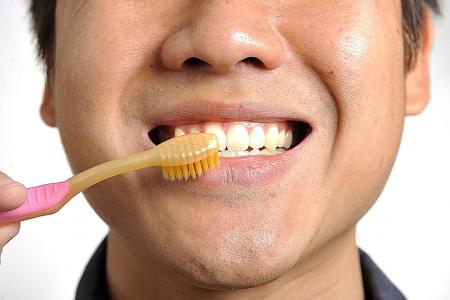Diabetes linked to irreversible gum disease
Diabetics more susceptible to gum diseases due to factors like poorer wound healing
Imagine losing your teeth when you are just 29.
That was what happened to Alan (not his real name), who had shaky teeth, gum pain and gum swelling shortly after he was diagnosed with diabetes.
He was found to be suffering from moderate to severe periodontitis, a gum infection that damages the soft tissue and destroys the bone that supports your teeth. Gum treatment was initiated.
But because too much support was lost for his upper and lower front teeth, as well as some molars, Alan's teeth had to be removed.
With treatment, he was able to keep his remaining teeth, which serve as good supporting teeth for dentures and for biting, Dr Chang Kok Meng said of his patient.
Alan is lucky. With regular gum and dental maintenance, he will be able to maintain his remaining teeth and gums.
Said Dr Chang, a specialist in periodontology and president of the Society of Periodontology Singapore: "There are other people who seek help when it is too late and all the teeth can no longer be salvaged due to severe destruction of the teeth support. Rehabilitation of such cases are often complex with compromised outcome."
While periodontal disease is common, a 2003 study published in the Singapore Dental Journal found it affected 40 per cent of adult diabetics in the moderately advanced stage.
Studies have also established that people with diabetes are two to three times more likely to develop irreversible gum disease than people without, said Dr Chang.
"The consequences of diabetes include poorer immune response, poorer wound healing, increased inflammatory response and impaired fat metabolism, all of which increase the susceptibility of a person with diabetes to develop severe gum disease.
EVIDENCE
"There is also emerging evidence to suggest that gum disease can increase the susceptibility of a person to develop diabetes and that effective gum treatment can improve diabetic control," he said.
But not all gum diseases affect the tooth support structures. When only the gums are affected - a condition called gingivitis - the process is reversible without permanent consequences.
"However, gingivitis can progress to periodontitis for people who are susceptible to the disease," warned Dr Chang.
Some tell-tale signs of gingivitis and periodontitis include:
- redness of the gums, a sign of inflammation;
- gums that bleed easily when brushing, flossing or eating;
- swollen gums;
- and bad breath.
You know your condition has progressed to periodontitis if you have itchy gums, your gums shrink away and expose more of the tooth, and when your teeth become shaky or start to shift.
Gum disease may also have a significant effect on medical conditions such as aspiration pneumonia, infected heart valves, atherosclerosis, stroke and diabetes mellitus.
"The impact of gum disease on health varies according to the type of medical condition and individual susceptibility.
"By treating gum disease and maintaining healthy gums, some risk for these conditions can be reduced, and the person has an added benefit of being in better overall health," said Dr Chang.
Prevention is better than cure - regular visits to the dentist and good habits such as flossing will help keep the condition at bay, he added.
Get The New Paper on your phone with the free TNP app. Download from the Apple App Store or Google Play Store now



